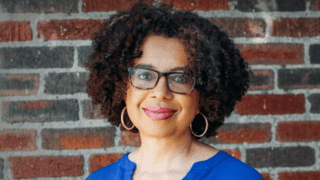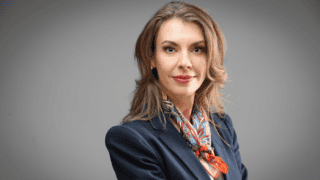The Lavin Agency Speakers Bureau
A speakers bureau that represents the best original thinkers,
writers, and doers for speaking engagements.
A speakers bureau that represents the best original thinkers,
writers, and doers for speaking engagements.
A better world for our most marginalized communities is a better world for us all.
If we want to create a truly equitable world, we need to make sure the system works for our most marginalized communities first, says Anna Gifty Opoku-Agyeman. As the co-founder of the only nonprofit addressing the pipeline and pathway problem for Black women in economics, finance, and policy, Anna is a fresh, dynamic voice dedicated to finding practical routes towards a more inclusive world. Her first book, The Black Agenda, is the first ever to feature Black experts offering solutions to inequality across different policy areas—and her second, The Double Tax, reveals why it’s so expensive to be a woman (especially a woman of color) in America, and the practical ways everyday people can start to level the playing field. In talks, Anna draws on her research to show you actionable and surprisingly simple ways to fight discrimination in the workplace and beyond, inspiring and empowering the next generation of leaders. “We cannot build a better world and leave people behind,” she says. “So we either live in a worse world, or we build a better one—and bring everybody with us.”
Anna Gifty Opoku-Agyeman is an award-winning researcher, writer, and speaker who studies workplace leadership and talent management. She’s a dynamic voice in conversations about inclusive policy-making, driven by the hope and promise of the next generation. She has spoken at conferences such as SXSW and NextUp, and at organizations including Google, Hallmark, the Ford Foundation, and Stanford University.
Her latest book, The Double Tax, is a revealing look into why it’s so expensive to be a woman in America—especially for women of color. It was named one of the best science books of 2025 by The Los Angeles Times. Drawing on her a wealth of research, Anna shows that not only do women incur higher costs than men, but also that Black and white women lead vastly different lives, marked by dramatic gaps in job opportunities, salaries, housing costs, childcare access, and generational wealth. She coins this gap as the “double tax,” the compounded cost of racism and sexism. And she helps us understand where the gaps are and where the double tax arises so that we can begin to even the playing field for all.
In 2022, she published The Black Agenda: Bold Solutions for a Broken System, a critically acclaimed collection featuring scholars and experts across economics, education, health, climate, criminal justice, and technology. She was named to the inaugural class of Forbes 30 Under 30 Boston. Her work is inspiring and impactful for the world we are building.
At the core of her research and advocacy, Anna focuses on addressing challenges faced by vulnerable populations. The Black Agenda highlights scholarship and expertise from leading voices across the U.S. The book has been praised by countless experts and New York Times bestselling authors, with Chelsea Clinton stating, “The Black Agenda is urgent. It’s urgent that people recognize that centering, listening to, and being led by the voices in this book are the start to investing in societal solutions.”
In addition to her research and policy work, Anna has led multiple award-winning youth initiatives and is attuned to the priorities of Generation Z. In 2018, she co-founded the Sadie Collective, the first nonprofit organization in the U.S. to address the underrepresentation of Black women and girls in the quantitative sciences. Under her leadership, the Collective gained support from leaders across economics, policy, and industry, including Janet Yellen, Secretary of the Treasury. Her efforts earned her the 2020 CEDAW Women’s Rights Award by the United Nations, making her the youngest recipient in its history. Past recipients include Vice President Kamala Harris and former Speaker of the House, Nancy Pelosi.
Anna’s writing and commentary have been widely featured in TIME Magazine, Bloomberg, The Washington Post, The Wall Street Journal, NPR, Forbes, and Newsweek. In 2019, she co-authored a viral New York Times op-ed with Dr. Lisa D. Cook, the first woman of color to sit on the Federal Reserve Board, about the importance of women’s representation in economics. Anna’s research and insights are sought after by policymakers, nonprofits, campuses, and companies worldwide.
She is the author of The Double Tax: How Women (of Color) Are Overcharged and Underpaid, which explores how the costs of womanhood affect lives across racial lines and what this means for society. Anna is currently a doctoral candidate studying Public Policy and Economics at the Harvard Kennedy School of Government and an alumna of UMBC, where she received her B.A. in Mathematics with a minor in Economics. She is a National Science Foundation Doctoral Fellow, Ford Foundation Fellow, a fellow of the Stone Program in Wealth Distribution, Inequality & Social Policy, and a former research fellow at Harvard Kennedy School’s Women and Public Policy Center.
Anna was fantastic. Her contributions to the conversation on inclusive work were so important and vital. We cannot express our extreme gratitude to Anna enough. Thank you to Lavin for all of your help in coordinating her speaking engagement with us.
StanfordHer brilliance shines through in everything she does. Her presentation and the incredible work she does in her research and in building the pipeline of Black Women in this field gave hope to so many in attendance.
TD Cowen
Harvard Economist MacArthur Genius Studying Economic Opportunity Director of Opportunity Insights

Author of Indivisible: How to Forge Our Differences into a Stronger Future Founder and CEO of WatchHerWork

Author of The 272: The Families who Were Enslaved and Sold to Build the American Catholic Church Tenured Professor at New York University Former New York Times Johannesburg Bureau Chief

Former CEO, Everyday Robots, Google’s Pioneering AI and Robotics Moonshot

Leading Cybersecurity Executive Former Director, Cyber Threat Intelligence Integration Center and IC Cyber Executive Principal, WestExec Advisors

Harvard Business School Behavioral Science Professor "40 Under 40 MBA Professor" Author of TALK: The Science of Conversation and the Art of Being Ourselves

Harvard Kennedy School Professor Author, How to Disagree Better

Harvard Economist MacArthur Genius Studying Economic Opportunity Director of Opportunity Insights

Speaker on Stress and Leadership in the Workplace Columbia Business School Professor Host, TED Business Podcast Expert, Limitless with Chris Hemsworth

#1 New York Times Bestselling Author of Grit and Situated | Pioneering Researcher on Grit, Perseverance, and the Science of Success

Nobel Prize Winner | 3rd Most Cited Economist in the World | Bestselling Co-Author of Why Nations Fail and Power and Progress

Harvard Business School Behavioral Science Professor | "40 Under 40 MBA Professor" | Author of TALK: The Science of Conversation and the Art of Being Ourselves

#1 New York Times Bestselling Co-Author of Abundance | Host of thePlain English Podcast | Founder of the Substack Derek Thompson

#1 New York Times Bestselling Author of How the Word Is Passed and Above Ground | The Atlantic Staff Writer

Why is it so expensive to be a woman in America? The “pink tax” has gained widespread recognition in recent years, but what happens when you look at the costs that define a woman’s entire life, especially across racial lines?
Drawing on her latest book, The Double Tax, Harvard researcher Anna Gifty Opoku-Agyeman summarizes the disparities that women face as they navigate life’s biggest moments. Not only do the numbers reveal that women incur higher costs than men, but also that Black and white women lead vastly different lives, marked by dramatic gaps in job opportunities, salaries, housing costs, childcare access, and generational wealth.
In this dynamic, optimistic talk, Anna offers actionable solutions for how everyday people, local communities, and global leaders alike can help relieve women of these costs for good. She helps audiences of any background understand where the gaps are and where the double tax arises so that we can begin to even the playing field for all.

As the next generation faces challenges like climate change and political uncertainty, equipping young people to lead and take action has never been more important. In this engaging fireside chat, Anna Gifty Opoku-Agyeman, a dynamic young researcher and thought leader, shares her insights on how to inspire leadership and action among young people.
Drawing inspiration from her interactions with students and young professionals, Anna reflects on her own journey as a young advocate, researcher, and leader. Through compelling personal anecdotes, she addresses topics that are vital for any company or organization: spanning justice, mentorship, corporate culture, and more.
Her profound experiences and insights inspire people of all ages to embrace their potential and drive positive change for a better world.

Workplace leadership and effective talent management are crucial to the success of any organization. But how can companies ensure they’re building the right strategies? Anna Gifty Opoku-Agyeman, a Harvard researcher with deep expertise in workplace leadership, provides data-driven approaches to help organizations strengthen their leadership pipeline and manage talent more effectively.
In this talk, Anna shares insights on how organizations can develop leadership at every level, from identifying high-potential employees to improving retention and fostering a culture of growth. She highlights the role of leadership programs, mentorship, and employee development initiatives in driving organizational success. You’ll learn how to use data to inform talent management strategies and create a culture where leadership thrives, ensuring that every employee can contribute meaningfully to the company’s goals.

In recent years, inclusion in academia and policy has been a significant focus. With policies like the Supreme Court’s ruling on affirmative action, the implications for various groups are profound. “We need solutions that extend beyond policy,” says Anna Gifty Opoku-Agyeman.
In this solutions-driven talk, Anna draws from her book The Black Agenda to explore the intersection of research and policy, making a powerful case for inclusive approaches. She shares case studies and offers practical examples of applying the book’s ideas on a broader scale, demonstrating why inclusive solutions are essential and how to achieve meaningful outcomes.